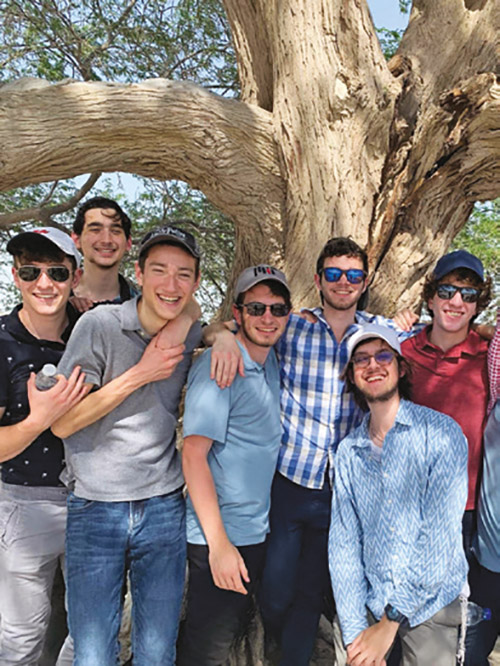
The sun was setting over Bahrain as students of Yeshivat Migdal HaTorah stepped off the tarmac into the arid desert twilight, making history as the first gap-year yeshiva to visit the Middle Eastern kingdom since the Abraham Accords were signed.
The purpose of their trip was twofold: to assist the indigenous Jewish community in Bahrain and to experience the impact of the Abraham Accords on Judeo-Islamic relations.
“One of the goals at Migdal is to challenge our talmidim’s stereotypes and open them up to new ways of thinking,” said Rabbi Dr. Dvir Ginsberg, rosh yeshiva of Migdal HaTorah. “After the signing of the Abraham Accords, I felt it would be important to embrace this new opportunity and take our talmidim to countries ready to welcome Jews with open arms.”
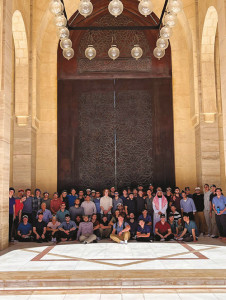
Prior to departing, students packed suitcases full of kosher chicken and other difficult-to-acquire items to deliver to the community.
According to Rabbi Shlomo Aouizerat, shaliach to Bahrain, visitors bringing meat is “our only source of kosher food.” He thanked the yeshiva for enabling them to continue providing religious services.
Upon arrival, students were greeted with warm weather and even warmer welcoming remarks from Eitan Na’eh, the Israeli Ambassador to Bahrain, who provided fascinating insights into the establishment of full diplomatic relations between Israel and Bahrain.
He explained how the Abraham Accords created a model of the type of amicable relationship Israel can replicate with other Arab states. Emphasizing the importance of intercultural comprehension between nations, Na’eh hailed visits like this as “the fruits of peace.”
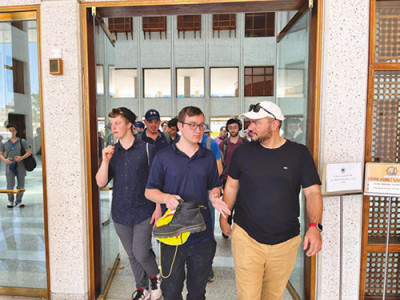
“Peace at the end of the day,” he stressed, “is done by people.”
The next day, the yeshiva made their way to Beit Aseret Hadibrot, the oldest synagogue in the Gulf, where students were privileged to recite a public reading of the weekday Torah portion for the first time in over 75 years.
“It was amazing,” said Rudi Weinberg, a madrich from the Upper West Side. “We were able to help them and give them [an] experience they hadn’t had in so long.”
Afterwards, they embarked on a walking tour of the souq, or marketplace, led by Ebrahim Daoud Nonoo, a leader in the Bahraini Jewish community and former member of Bahrain’s Parliament. He detailed the history of the modern Bahraini Jewish community, which dates back to the 1800s and has maintained a continuous presence ever since—even as other communities in the Middle East were forcibly disbanded following the establishment of the State of Israel.
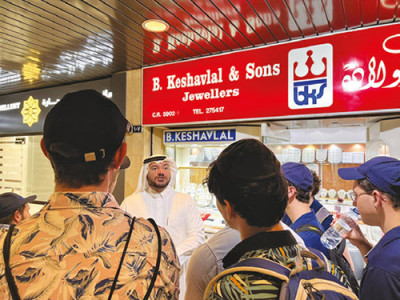
He went on to describe challenges the community faces including its size and attrition rates. Nevertheless, Nonoo remains optimistic these issues can be addressed, citing the rising number of Jewish expatriates moving to the country following the signing of the Abraham Accords.
Throughout the tour, Nonoo sparked friendly conversation with locals, allowing students to see for themselves what coexistence looks like.
Later in the day, the yeshiva was given a personal tour of the Bahrain National Museum by Loay al-Sharif, head of the Loay Academy. Students engaged in a healthy dialogue with al-Sharif, asking numerous questions on Bahraini history and the intricacies of Islamic theology. The discussion brought to light many similarities between Islam and Judaism.
Moshe Levin, a student from Teaneck, found his conversation to be a refreshing change of pace from other non-Jewish speakers he’d spoken with. He went on to praise al-Sharif for remaining “firm in his beliefs,” which Levin maintains created an authentic and honest discourse often missing in today’s world.
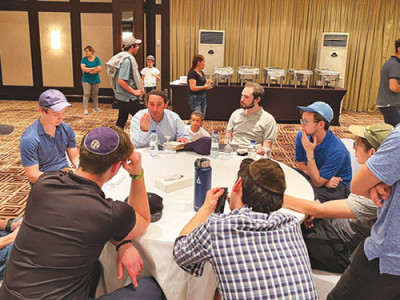
After spending the afternoon getting to know each other, the day concluded with a speech from al-Sharif. “Muslims and Jews should never fight,” he told the students. “If we focus on what’s in common we can make great change.”
The next day students journeyed to the world-renowned Beit al-Quran Museum, followed closely by a tour of the Al-Fateh Grand Mosque. Students enjoyed comparing and contrasting the two religions in a fruitful exchange of ideas. The guide happily answered every question, from minute details regarding daily prayer rituals, to esoteric questions about monotheism.
“It was a very respectful conversation on both sides,” said Sam Savetsky, a student from Bergenfield. “It felt like a real interfaith dialogue.”
One of the most impactful portions of the trip came when the students visited the oldest operational Jewish cemetery in the Gulf. “I was really moved,” Weinberg said. “It made me so happy they actually had one and that they actually repaired it.”
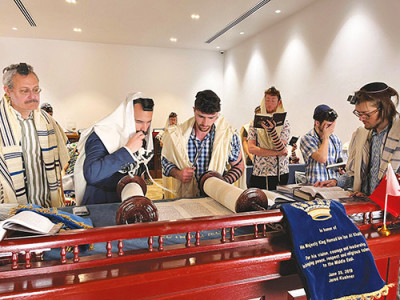
The trip concluded at the Bahrain International Karting Circuit, where the yeshiva was privileged to meet a member of the Bahraini Royal family. In between races, students had the unique opportunity to discuss numerous topics with the Sheikh, from culture to public affairs and everything in between.
Students heard from a variety of speakers during their time abroad, including U.S. Navy Chaplain Rabbi Levi Ceitlin, Board Member of Beit Aseret HaDibrot Ahmed al-Kooheji, and Imam Ali Salah of the Al-Fateh Grand Mosque. They were also privileged to be joined by Rabbi and Rebbetzin Donath of Congregation Darchei Noam in Fair Lawn, New Jersey. Each speaker shared their own unique perspective, but one common idea emerged—there is more that unites us than divides us.
“There are some extremists on both sides,” Eitan Zomberg, a student from Manhattan, told The Jewish Link. “But the general consensus is most people want peace.”
Organizing the trip required months of coordination between the yeshiva and community leaders in Bahrain. Thanks to the hard work of faculty members such as Rabbi Aryeh Wasserman as well as generous support from Mark and Galina Moerdler, the yeshiva had planned a jam-packed and memorable trip.
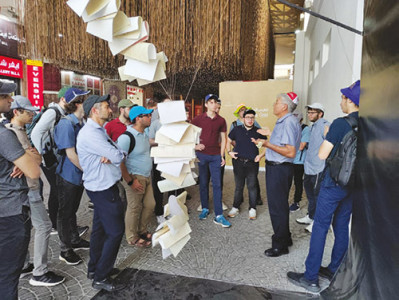
However, as the saying goes, “Man plans; God laughs.”
Weeks before the yeshiva was set to depart, tensions flared over the Temple Mount. Citing Israeli aggression, one tour guide refused to meet with the yeshiva. The issue was eventually resolved and everything proceeded as scheduled.
Rabbi Wasserman later told students this incident illustrates the complexity of the normalization process, but highlighted that trips like these as one of many small steps that can accelerate change.
Unsure if there would be a backlash over their Jewish identity, students entered Bahrain with baseball caps and tucked-in tzitzit. Those initial concerns were soon assuaged once they began familiarizing themselves with the culture.
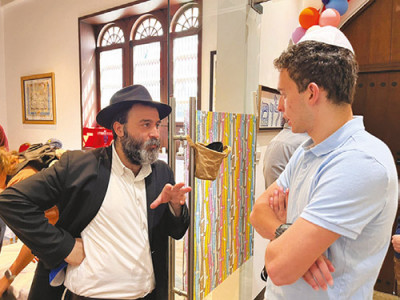
Moshe Koppel, a student from Teaneck, recalls Rabbi Ceitlin explaining how he openly wears his tzitzit and kippah wherever he goes. “If you’re proud and confident about your religion, people respect it.”
Throughout the trip, students gained a deeper understanding of a people they had no previous connection with. Many described the experience as “eye-opening,” and were grateful to have their perspectives broadened in such a personal manner.
“I was so proud of the kiddush Hashem displayed by our talmidim,” said Rabbi Ginsberg. “The questions [they] asked reflected a tremendous level of maturity, respect and sophistication.”
As the sun rose over the Israeli horizon, the students stepped into the arrival hall of Ben Gurion International Airport, inspired by the interfaith experiment in which they took part and hopeful their presence in Bahrain signaled the dawn of a new era in Judeo-Islamic relations.
David Deutsch is a shana bet student currently studying at Migdal HaTorah in Modi’in.













